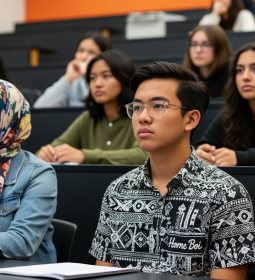Study abroad today no longer seems, as before, an amazing event and something on the verge or beyond fiction. This is a common practice, which does not prevent it from overgrown with dozens of myths of varying degrees of maliciousness. They say that the language there is mandatory at the highest level, and foreign education suits only extraodinary students. Let's try to deal with some myths together.

Excellent command of a foreign language is required
Without the skills of a spoken foreign language abroad, there is nothing to do: you will not find a job, nor will they take you to study. Another thing is the level of knowledge and competence. Passing language tests is not easy, especially for high scores.
Most universities, summer courses, and more do just fine with moderate test scores. Unless, of course, you're going to study journalism or medicine. In addition, universities are international, which in itself implies the heterogeneity of the student and teaching contingent, so it is unlikely that you will stand out. And knowledge of any other language, in addition to English, will be a positive factor during the application for a grant.

Studying abroad is very expensive
The assumption of an exorbitant price for studying abroad is not an uncommon reason for refusing to even try to go there to study.
In fact, you can get a cherished hat and a diploma almost for free. Yes, the courses are expensive, and the programs are even more expensive, but the system of exchanges comes to the rescue and grants. You can get the latter not only from universities, but also from the state, NGOs, corporations.

Making your way among hundreds of other contenders won't be easy, but no one promised an easy path, did they? Every year they are received by hundreds of thousands of students. Grants are very diverse and numerous: somewhere they prefer technicians, others take and support humanitarians. You just need to find the perfect option, apply – and wait for success.
It's hard to do, and it's even harder to learn
It's true. But let's be honest with each other: it is not easy to get into a decent university in our country, and studying will require 120% calculation. Here, domestic and foreign institutions are approximately equal (but it is still more equal behind the hill).
You will have to give your best, there will be more work and challenges. However, it should be remembered: they do not come according to the results of exams, but according to a combination of a number of factors, including recommendations, marks and paperwork.

Ultimately, the choice of the selection committee will be influenced by the choice of a particular specialization, the economic and political situation in the country as a whole and in a particular university, various quotas and the availability of free teachers. So this myth appeared for a reason.
Staying abroad still won't work
Contradictory. Much depends on the grant or the course you choose. For example, the Chevening program requires that after completing your British studies, you go to your historical homeland and apply the knowledge and competencies gained in practice.
There is an option to stay immediately: find a permanent job in the country. It's not easy, but it's not impossible. Sometimes the university can help: you can take part in job fairs or look for contacts in the dean's office.










